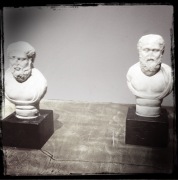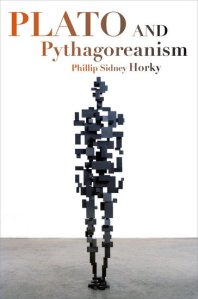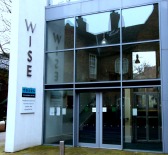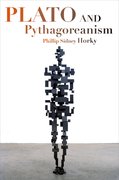The conference on Plato’s Academy, which took place this past week at the University of Athens, organized chiefly by Paul Kalligas (Athens), Chloe Balla (Crete), and Vassilis Karasmanis (Athens), was, in this writer’s opinion, an unqualified success. Overall, the papers and discussion forced the many excellent scholars who participated to obtain greater precision in several areas of interest, of which I will discuss four [[1]].

Plato in the Shadow of Aristotle? The New Plato Bust in the Acropolis Museum
First of all, there were heated debates concerning the interpretation and influence of Plato’s philosophy among his successors in the 4th and 3rd Centuries BCE. This was an important theme in various papers, especially those of John Glucker (Tel Aviv), who cast doubt on the possibility that interpretive models associated with the so-called ‘Tubingen School’ could be justified by evidence from antiquity, and of Katharina Luchner (Munich), who supplied a very careful stylistic analysis which showed how the Seventh and Thirteenth Letters represented diverse appropriations of Plato’s philosophy through rhetorical and doctrinal presentation. In this vein, too, the stylometrical and historical analyses of the works of contested authorship by Harold Tarrant (Newcastle, Australia) were a welcome addition, forcing us to think more about not just the importance of later Platonist dialogue-writers such as Philip of Opus, but also the role that these figures played in the institutions that helped to shape the reception of Plato’s philosophy. Individual figures associated with the Early Academy were also featured: István Bodnár (Budapest) presented a good case for the differentiation between two camps in the Early Academy with regard to the formulation and use of the mathematical sciences (astronomy and harmonic theory); Henry Mendell (CSU-Los Angeles) expanded our understanding of the actual observations of celestial objects by the astronomers from Cyzicus (including Eudoxus), highlighting their role in providing empirical evidence for Aristotle’s use, while at the same time casting doubt on Eudoxus’ importance within the Academy; and John Dillon (Dublin) aimed to elucidate the applied ethics of Polemon, which differentiated him from his senior colleague, Xenocrates, whose dialectical approaches to the precepts of Pythagoras and Triptolemus I discussed in my own contribution. A brilliant and, in many ways, charmingly paradigmatic teacher-student debate exploded between Vassilis Karasmanis (Athens) and Michalis Sialaros (London), who took opposing sides on the issue of whether Euclid could be considered a product of Plato’s Academy, with the issue left in the balance at the end (although I probably lean against Euclid’s Platonic inheritance, but not necessarily for the reasons Sialaros pointed out).
A second ‘hot topic’ of the conference was the articulation of Platonic doctrines and schools in the late Hellenistic and Roman Republican periods. Oliver Primavesi’s (Munich) intrepid analysis of the manuscript tradition of Alexander of Aphrodisias revealed a new testimonium for Eudorus of Alexandria’s metaphysics, which focused on the relationship between the material principle and the Forms. David Sedley (Cambridge) argued compellingly that Carneades’ atheistic sorites arguments presented not an attack on the Stoics, but rather an example of a particular mode of Academic disputation on various topics. Several hetairoi of Sedley focused especially on the history of the Academy in the 2nd and 1st Centuries BCE. Myrto Hatzimichali (Cambridge) presented a careful analysis of Philodemus’ approach to writing about the scholarchs of the Academy, focusing on both historiographical and philosophical elements. Mauro Bonazzi (Milano) and Georgia Tsouni (Bern) obtained mostly divergent conclusions (to my eye) of the philosophical and doctrinal underpinnings of Antiochus of Ascalon, extending some of the conclusions they reached in their earlier contributions to The Philosophy of Antiochus (ed. Sedley, Cambridge 2012) by thinking more about the sociology and competitive philosophical milieu of Antiochus’ ‘Old Academy’. The dilemma of Antiochus’ Platonism remains difficult to solve, if stimulating to contemplate.
There was a palpable sense of symbiosis between Hatzimichali’s paper and that of Matthias Haake (Münster), who provided a most compact discussion of the political and social history of the Academy in Athens (with appeal especially to inscriptional evidence) from the mid-4th Century BCE until its ‘end’ (or one of its many ‘ends?’ – as Bonazzi’s paper encouraged us to contemplate) with Sulla’s arrival in Athens in 86 BCE. It is my hope that they will use one another’s discoveries to nuance their own contributions, if the papers go on to be published. And Paul Cartledge (Cambridge) provided a thoughtful, if finally aporetic, discussion of the social and political influence of the ‘members’ (scare-quotes in original) of the Academy in the political culture of the Greek world, topped of with a comparative analysis between the Academy and the RAND Corporation. Cartledge’s paper was a fit dedication to the late Trevor Saunders, who did so much to encourage us to think about Plato’s Laws beyond Plato.

They told us the one on the left was Plato, but I rather think it’s Plocrates (h/t to Christopher Rowe)
Finally, two papers in particular encouraged us to think about possible allusions to academic practices embedded in the dialogues of Plato. Thomas Szlezák (Tübingen) sought to extract evidence for unwritten doctrines from within Plato’s dialogues, and there was a vigorous debate concerning the authority and status of the enigmatic statements concerning what cannot be said at the present moment by Plato’s speakers; and the ever-effervescent Alexander Nehamas (Princeton) showed that the way in which Plato works out the consequences of Zeno’s claim in the Parmenides that ‘all is not many’ through dialectical exercises in the second half of the work, which might point to actual practice in logic.
We were able to visit the new Acropolis Museum, where we saw new copies of busts of Plato and Aristotle – as well as the homunculi versions of Plato and Socrates you see above – and had a short tour of the park known as the Academy, where the photo associated with my gravatar to the left was snapped (extemporaneous photo by Henry Mendell of me lecturing in Plato’s Academy, actually at the 4th Century Peristyle building that I fantasize was the location of Plato’s Academy).
I admit to having fought back a tear or two while standing there, and the generous dogs who occupied the park didn’t mind at all.
[[1]] Unfortunately, I had to leave early in the morning on Sunday and sadly missed what I’m sure were terrific papers on the archaeology and material culture of the Academy by Manolis Panayotopoulos Tania Chatziefthymiou (Athens), Effie Lygkouri-Tolia (Athens), Ada Caruso (Rome), Voula Bardani (Athens), Daniela Marchiandi (Torino), Angelos Matthaiou (Athens), Ismini Trianti (Ioannina), and Stephen Miller (UC-Berkeley).







